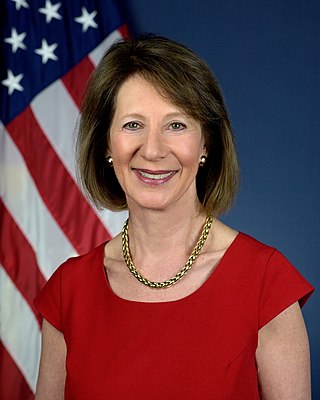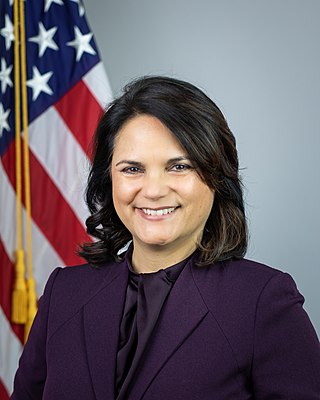
The Federal Housing Administration (FHA), also known as the Office of Housing within the Department of Housing and Urban Development (HUD), is a United States government agency founded by President Franklin Delano Roosevelt, established in part by the National Housing Act of 1934. Its primary function is to provide insurance for mortgages originated by private lenders for various types of properties, including single-family homes, multifamily rental properties, hospitals, and residential care facilities. FHA mortgage insurance serves to safeguard these private lenders from financial losses. In the event that a property owner defaults on their mortgage, FHA steps in to compensate the lender for the outstanding principal balance.
In the United States government, independent agencies are agencies that exist outside the federal executive departments and the Executive Office of the President. In a narrower sense, the term refers only to those independent agencies that, while considered part of the executive branch, have regulatory or rulemaking authority and are insulated from presidential control, usually because the president's power to dismiss the agency head or a member is limited.

The Center for American Progress (CAP) is a public policy research and advocacy organization which presents a liberal viewpoint on economic and social issues. It has its headquarters in Washington, D.C.

The National Economic Council (NEC) is the principal forum used by the president of the United States for the consideration of domestic and international economic policy matters with senior policymaking and Cabinet officials, and forms part of the Office of Policy Development which is within the Executive Office of the President of the United States.

The National League of Cities (NLC) is an advocacy organization in the United States that represents the country's 19,495 cities, towns, and villages along with 49 state municipal leagues. Created in 1924, it has evolved into a leading membership organization providing education, research, support, and advocacy to city leaders across America. Based in Washington, D.C., it is considered part of the 'Big Seven', a group of organizations that represent local and state government in the United States. The NLC provides training and other resources to municipal officials, holds conferences, and advocates to the federal government on behalf of cities, towns and villages.

The Urban Institute is a Washington, D.C.–based think tank that conducts economic and social policy research to "open minds, shape decisions, and offer solutions". The institute receives funding from government contracts, foundations, and private donors.

The School of International and Public Affairs (SIPA) is the international affairs and public policy school of Columbia University, a private Ivy League university located in Morningside Heights, Manhattan, New York City. It is consistently ranked one of the leading graduate schools for international relations in the world. SIPA offers Master of International Affairs (MIA) and Master of Public Administration (MPA) degrees in a range of fields, as well as the Executive MPA and Ph.D. program in Sustainable Development.
Executive Schedule is the system of salaries given to the highest-ranked appointed officials in the executive branch of the U.S. government. The president of the United States appoints individuals to these positions, most with the advice and consent of the United States Senate. They include members of the president's Cabinet, several top-ranking officials of each executive department, the directors of some of the more prominent departmental and independent agencies, and several members of the Executive Office of the President.

The federal administration of Switzerland is the ensemble of agencies that constitute, together with the Swiss Federal Council, the executive branch of the Swiss federal authorities. The administration is charged with executing federal law and preparing draft laws and policy for the Federal Council and the Federal Assembly.

The Federal Housing Finance Agency (FHFA) is an independent federal agency in the United States created as the successor regulatory agency of the Federal Housing Finance Board (FHFB), the Office of Federal Housing Enterprise Oversight (OFHEO), and the U.S. Department of Housing and Urban Development government-sponsored enterprise mission team, absorbing the powers and regulatory authority of both entities, with expanded legal and regulatory authority, including the ability to place government-sponsored enterprises (GSEs) into receivership or conservatorship.
Regulatory responses to the subprime crisis addresses various actions taken by governments around the world to address the effects of the subprime mortgage crisis.

Deborah "Debbie" Matz is an American civil servant who served as the 8th Chairman of the National Credit Union Administration.

Diana Furchtgott-Roth is an American economist who is adjunct professor of economics at George Washington University and a columnist. She served as Deputy Assistant Secretary for Research and Technology at the United States Department of Transportation during the Trump administration. She previously served as Acting Assistant Secretary for Economic Policy at the U.S. Department of the Treasury.

Nani A. Coloretti is an American policy advisor who is currently serving as the deputy director of the Office of Management and Budget. Coloretti served as United States Deputy Secretary of Housing and Urban Development from 2014 to 2017. Following her service as deputy secretary, she became senior vice president for financial and business strategy and treasurer at the Urban Institute.
Karen M. Pence is an American economist who is Deputy Associate Director of the Research and Statistics Section of the Federal Reserve Board of Governors, responsible for the Survey of Consumer Finances, and former Chair of the Board of the Panel Study of Income Dynamics. She is a past president of the American Real Estate and Urban Economics Association.
Collins v. Yellen, 594 U.S. ___ (2021), was a United States Supreme Court case dealing with the structure of the Federal Housing Finance Agency (FHFA). The case follows on the Court's prior ruling in Seila Law LLC v. Consumer Financial Protection Bureau, which found that the establishing structure of the Consumer Financial Protection Bureau (CFPB), with a single director who could only be removed from office "for cause", violated the separation of powers; the FHFA shares a similar structure as the CFPB. The case extends the legal challenge to the federal takeover of Fannie Mae and Freddie Mac in 2008.











